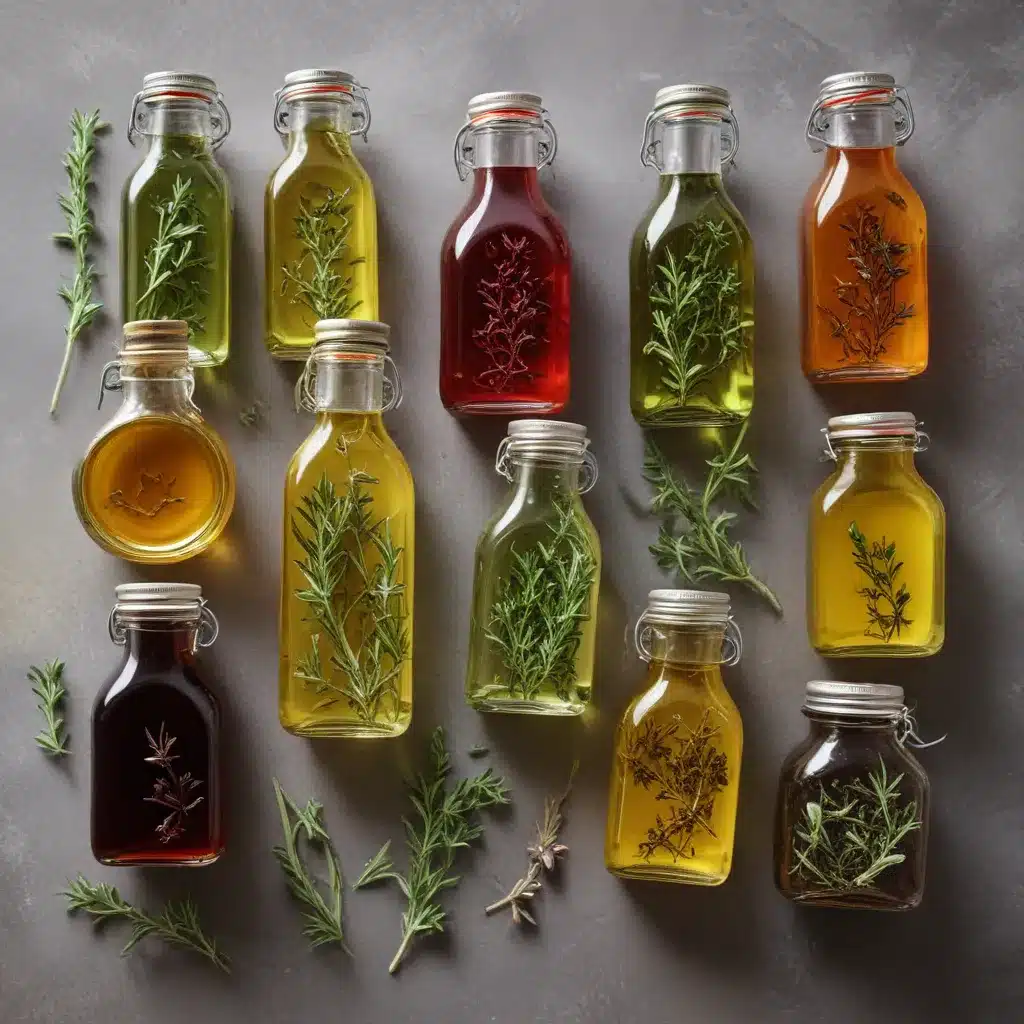
Eager to elevate your cooking with garden-fresh flavors? Look no further than the art of crafting your own herb-infused oils and vinegars right at home. These versatile condiments allow you to capture the essence of your culinary herbs and edible flowers to enliven any dish – from salads and marinades to sauces and dips. With a few simple techniques, you can transform your bountiful harvest into a pantry full of delectable, shelf-stable dehydrated delights.
Dehydrated Ingredients
The foundation of your infused oils and vinegars starts with properly dehydrating your ingredients. Whether you’re working with dried herbs, spices, or even edible flowers, ensuring they are thoroughly dried and free of moisture is key to creating a stable, long-lasting product. For herbs, simply hang small bunches upside down in a cool, dark place with good air circulation. Alternatively, use a food dehydrator set to the appropriate temperature for your specific plant material.
Once your ingredients are crisp and brittle, you can begin the infusion process. When selecting herbs, consider the flavors you wish to capture – classics like basil, rosemary, and thyme work wonderfully, but don’t be afraid to experiment with more unique offerings from your garden, such as lemon balm, lavender, or nasturtium flowers.
Infusion Techniques
Oil Infusion
To create herb-infused oils, simply place your dried herbs in a clean, sterilized glass jar and cover them completely with a high-quality, neutral-flavored oil like avocado, grapeseed, or extra virgin olive oil. Seal the jar and allow it to steep in a cool, dark place for 4-6 weeks, shaking occasionally. The longer the infusion time, the more intense the flavor will become.
For a quicker method, you can also use a gentle heat source, such as a slow cooker or dehydrator, to speed up the extraction process. Set the temperature to the lowest setting, usually around 100-125°F, and let the oil and herbs mingle for 8-12 hours, keeping a close eye to prevent overheating.
Vinegar Infusion
Creating herb-infused vinegars follows a similar process, but with a few key differences. Begin by packing your dried herbs into a sterilized glass jar, then pour in an apple cider, red wine, or white wine vinegar of your choice, ensuring the plant material is fully submerged. Seal the jar and let it sit for 4-6 weeks, shaking occasionally.
Unlike oil infusions, vinegar extractions can be accelerated by gently heating the mixture. Simply place the sealed jar in a slow cooker or dehydrator set to the lowest temperature and let it steep for 8-12 hours. Be mindful that prolonged exposure to heat may diminish some of the beneficial properties of the raw vinegar.
Culinary Applications
Seasoning Dishes
Your homemade herb-infused oils and vinegars are the perfect way to add a burst of flavor to a variety of dishes. Use them as the base for marinades, salad dressings, and sauces, allowing the unique profiles of your infusions to shine. A drizzle of rosemary-infused olive oil can elevate a simple grilled chicken, while a splash of balsamic-berry vinegar can transform a leafy green salad into a work of art.
Preserving Flavors
Beyond seasoning, these infused condiments make excellent shelf-stable additions to your pantry. Store them in airtight containers and use them as flavor-enhancing garnishes for soups, stews, and roasted vegetables. The antioxidant-rich oils can also be used for sautéing, baking, or drizzling over finished dishes to lock in those precious garden-fresh notes.
Flavor Profiles
Herb-Infused Oils
Basil-Infused Olive Oil: Capture the bright, herbaceous notes of fresh basil in this classic Mediterranean-inspired oil. Drizzle over caprese salads, use in pesto, or elevate your favorite pasta dishes.
Rosemary-Infused Olive Oil: The robust, piney aroma of rosemary lends itself beautifully to savory applications. Toss roasted potatoes or vegetables in this fragrant oil, or use it as a marinade for grilled meats.
Thyme-Infused Olive Oil: Earthy and woodsy, thyme-infused oil is a versatile staple. Incorporate it into salad dressings, brush it on bread or focaccia, or use it to sauté mushrooms and onions.
Vinegar Infusions
Balsamic-Infused Vinegar: The rich, syrupy sweetness of balsamic vinegar pairs beautifully with herbs like rosemary, basil, or oregano. Drizzle over roasted vegetables, use in marinades, or whisk into vinaigrettes.
Red Wine Vinegar Infusion: The bold, tangy profile of red wine vinegar can be enhanced with a variety of herbs and spices. Try infusing it with peppercorns, garlic, or a blend of Mediterranean herbs for a multifaceted condiment.
White Wine Vinegar Infusion: This lighter, more delicate vinegar is an excellent canvas for more subtle flavors. Experiment with delicate herbs like lemon thyme, chamomile, or even edible flowers like nasturtiums or violas.
Health and Wellness
Beyond their culinary uses, these homemade herb-infused oils and vinegars offer a wealth of health benefits. The antioxidants and anti-inflammatory properties inherent in many herbs and spices can help support overall wellness, while the digestive-aiding properties of vinegar make these infusions a versatile addition to your pantry.
Incorporate these flavorful condiments into your daily routine by drizzling them over salads, using them in marinades, or enjoying them as natural remedies and wellness tonics. The aromatic properties can also be harnessed for aromatherapy, providing a soothing, grounding experience as you cook or entertain.
Embrace the abundance of your garden and the power of dehydration to create a pantry full of homemade herb-infused oils and vinegars that will elevate your culinary creations and support your family’s health and wellness all year round. For more information on Crooked Pines Farm, be sure to visit our website and explore our wide range of farm-fresh offerings and educational resources.


